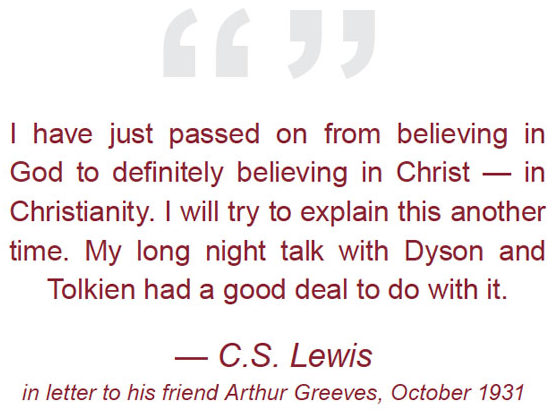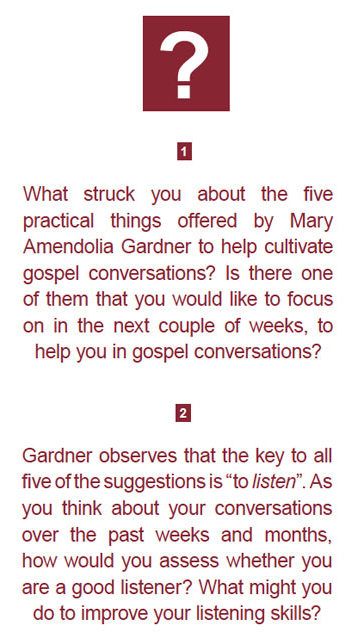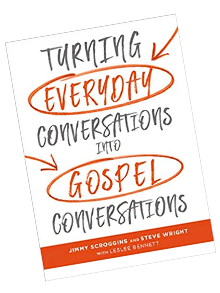Back to series


Recommended Reading:

Five Ways to Start Gospel Conversations
Click here to open a Print-Friendly PDF
In November 2017 at Christie’s auction house, a Saudi prince paid $450.3 million, the highest price ever for a work of art, for Leonardo da Vinci’s painting Salvator Mundi. Leonardo’s painting of Jesus as Savior of the World is controversial for many reasons; notably, experts disagree as to whether Leonardo himself painted it! In the days following the sale, several Christian writers and commentators were quick to note that all might have the Savior of the world, for free. Indeed.
 How might this be? Through us, Jesus’s disciples, who are commanded at the end of Matthew 28 to “go therefore and make disciples of all nations.”1
How might this be? Through us, Jesus’s disciples, who are commanded at the end of Matthew 28 to “go therefore and make disciples of all nations.”1
As a young Christian, new to the faith, I stood with a few other friends on a busy street corner in Georgetown and handed out gospel tracts on Friday nights, mostly to intoxicated university students. It was a great opportunity to meet and talk to people. No one ever came to faith. We prayed for people, we shared the gospel, but we did not “convert” or pray the sinner’s prayer with anyone. Was it a waste of time? Yes and no. We engaged in cold-calling evangelism, which is often ineffective. We had no natural connections to the people with whom we shared our faith. What my friends and I managed to do, though, was to start great conversations.
“Evangelism” can bring to mind both negative and positive images: of someone yelling “repent” at people through a bullhorn or of the kindly person who first shared Jesus with us. There is no formula; there is no one right way to share the good news. As there are varieties of people, there are varieties of approaches to sharing our faith.
Instead of fearing the “e” word, it might be helpful to think of evangelism as a way to achieve great conversations. Whether our natural inclination is introvert or extrovert, we are all called to be witnesses to Jesus. After all, if we understand the grace of God, if we have a dynamic relationship with Jesus, if we know His love, His nature, His transforming power and forgiveness, how can we not tell others about God’s goodness? As Nathan Betts recently wrote for Christianity Today: “When we diminish the work of evangelism and apologetics — as ineffective or as a secondary concern — we cheapen the gospel itself. If we believe the gospel is good news, true for all people, we cannot give up on making the case for our beliefs.”2 One way of making our case for our beliefs is by having great conversations. How to begin?
Start with prayer.
Begin to pray for those you would like see come to faith. Ask God to give you people to pray for and then pray for them faithfully every day. I know one pastor who daily prays for family, friends, and neighbors. In addition, he includes prayers for specific world leaders and celebrities to come to faith in Jesus. We serve a great and mighty God, and with God all things are possible. Rely on God. Ask Him to provide you with the opportunity, courage, and right words to say. He promises to use you if you are willing.
Building on this foundation of prayer, here are five practical things that will help cultivate gospel conversations.

Be a good listener.
Try listening to someone else; don’t interrupt or formulate your response in your head, but simply aim to listen and understand the other person. Try an experiment: see how long you can listen to another person without interjecting your own thoughts. It is harder than you think.
Having good conversations requires courage. To paraphrase Winston Churchill, we need courage to stand up and speak; we also need courage to sit down and listen. Social media is filled with noise and people eager to flaunt their “genius” point of view. It is the rare and wise person who takes the time to truly listen. Think of the effect it has on us when we believe someone has truly listened to us, and let us consider how we might listen well to another.
If you are a talker or, like most of us, lack self-awareness of the tendency to speak too much, ask the Lord to help you be a better listener. The world needs more listeners and fewer talkers. We can win a friend if we are simply willing to listen.
Good conversations are dialogues, not monologues.
Be curious, ask lots of questions, and listen. Read the Gospels and consider how Jesus engaged with other people. Jesus asked questions; 173 of them, in fact, are recorded in Scripture.3 For instance, He asked, “What do you think?” (Matt. 21:28); “Why are you anxious?” (Luke 12:26); “Who is greater, one who reclines at table or one who serves?” (Luke 22:27); “What are you seeking?” (John 1:38); “Do you take offense at this?” (John 6:61).
Asking questions opens up conversations rather than shutting them down. People are not projects. When we engage with others, we have the opportunity to demonstrate the love, care, and nature of Jesus. Here are some possible questions for conversations:
• Isn’t it possible that…?
• Might it be true…?
• How do you know…?
• What do you think…?
Sometimes in our asking questions and demonstrating concern rather than simply being argumentative, people will ask the real questions that are burning in the back of their minds. And an important part of dialogue is integrity. If you don’t know the answer to a question, just say so. This is also a reminder that knowledge of basic apologetics will increase your own faith as well as enable you to share it more readily with others.
Share your story and listen to another’s.
 One of the most compelling gospel stories is your own story. How did you come to faith? What difference has it made in your life? Perhaps you have never reflected on this. It is worth taking the time to write out your testimony. Have a ten-minute version and consider a two-minute version, too. It doesn’t matter if your journey to faith was not dramatic; the point is that it is your story.
One of the most compelling gospel stories is your own story. How did you come to faith? What difference has it made in your life? Perhaps you have never reflected on this. It is worth taking the time to write out your testimony. Have a ten-minute version and consider a two-minute version, too. It doesn’t matter if your journey to faith was not dramatic; the point is that it is your story.
Learning to tell the story of our faith journey takes practice. What we tell, and to whom, depends on the context, who is asking the question, and why they want to know. The book of Acts is full of examples of different approaches to evangelism.
First Peter 3:15–16 says,
In your hearts honor Christ the Lord as holy, always being prepared to make a defense to anyone who asks you for a reason for the hope that is in you; yet do it with gentleness and respect, having a good conscience, so that, when you are slandered, those who revile your good behavior in Christ may be put to shame.
Our role as Jesus’s disciples is always to be prepared to share the hope that we have in us. And one of the best ways to do this may be to tell others about our journey of faith. The key is that we must do so in gentleness and respect, not being arrogant, forceful or obnoxious.
Sharing one’s story is not merely retelling facts. Storytelling is an art form. Part of telling one’s story of faith is listening to the other person. What sorts of questions are they asking? What is their background, their personal situation, their own history of encounters with religion or with Christianity? How might we listen well, and how might we ask them good questions?
When I share my testimony, I don’t necessarily tell my entire testimony sequentially nor do I tell all parts of my story. Sometimes I just share one significant event in my faith journey. It all depends on context and the person with whom I am speaking. Discernment is necessary.
Practice hospitality.
When was the last time you invited someone over to your house for dinner, dessert, or a cup of coffee? Seek friendship, not conversion. In his book Evangelism and the Sovereignty of God, J.I. Packer writes: “The right to talk intimately to another person about the Lord Jesus Christ has to be earned, and you earn it by convincing him that you are his friend, and really care about him.”4
Conversation is easier when you are relaxed, enjoying a meal together. Hospitality does not need to be elaborate. Hospitality is not something learned on the pages of Pinterest; it is learned from Scripture, through verses such as Isaiah 58:7; Romans 12:9–13; 1 Peter 4:8–9; and Hebrews 13:1–2.
Serve others.
All three of the New Testament passages cited above mention hospitality in the context of loving one another. Biblical hospitality is concerned with more than a beautifully presented meal and engaging after-dinner entertainment. It is concerned with seeking to love others by serving them (Rom. 12:7, 10).
All sorts of things are said in the media these days about Christians. We can demonstrate our Christian faith through tangible acts that speak to the reality of our faith and love. Giving of our time as a volunteer is one way to show care and commitment to our neighbors and communities. Consider volunteering as an English-as-a-second-language teacher or serve the local food pantry, whether or not these are part of your church’s official ministries. Or meet tangible needs. Offer to babysit your neighbors’ kids, provide financial help, or pray for a need.
I’ve offered five suggestions. As you might have noticed, the key to all of them is to listen. Truly listening will come as a surprise to many today and make an opening for the other person to be willing to listen in return. Wisdom and compassion are the prerequisites for evangelism; each is enhanced by the discipline of listening.
Will having better conversations result in the conversion of people to Christianity? Perhaps. It will at least help some move from hostile or unknowing to being curious and perhaps open to change. The process of coming to faith is not necessarily sequential or linear, rather, it is often a journey in which each stage is important.
 So as you start to have these conversations, relax and be yourself, but also be intentional. Pray to overcome your fears. Get used to the occasional awkwardness, but then return to friendship rather than argument. Befriending someone at this level may be costly, but discipleship is costly.
So as you start to have these conversations, relax and be yourself, but also be intentional. Pray to overcome your fears. Get used to the occasional awkwardness, but then return to friendship rather than argument. Befriending someone at this level may be costly, but discipleship is costly.
At some point, in some conversations, it may be time to be direct. Ask the person God has placed on your heart where they are spiritually, what their view of God is, and what they think about this whole "Jesus thing." Ideally, the foundation for this conversation will have been well laid.
When another person is ready to listen, what should we say? I’ve suggested that our own faith story can be an important part of what to say. And then, of course, share the gospel: creation, fall, redemption (the cross), future hope.
Be bold when the time comes. After you have listened to someone deeply, explain honestly why you're a Christian. Be positive and clear about how much Jesus means to you. The Holy Spirit will be with you every step of the way! Invite rather than demand a decision.
Not many of us may have the gift of evangelism, but evangelism is a vital part of our own discipleship and spiritual formation. Paul told Timothy do the work of an evangelist (2 Tim. 4:5). Just because we don’t have the supernatural gift of evangelism doesn’t mean we get a pass at sharing and defending our faith. And I would venture to say we will not mature in our faith until we do so. To help, the C.S. Lewis Institute has great resources on conversational apologetics and evangelism.5

God doesn't require results from us. Our responsibility is to plant seeds of the gospel. Perhaps the parable of the sower will be helpful here. One plants, another waters, and still another harvests. Every Christian is called to — and all of us can — sow seeds of the gospel (Mark 4). Our role is to be faithful witnesses and to share with others how our relationship with Jesus affects our day-to-day life.
Amy Orr-Ewing recently offered some similar advice:
The Lord is the one doing stuff and we get to be a part of it! The minute we take on the responsibility of the salvation of the world onto ourselves, let alone the salvation of our family, neighborhood, school, or workplace, we begin to take on something that is a burden, and I want to encourage you. We are actually being invited into an adventure… We are invited to be God’s ambassadors, we have a role to play, and we are not in this alone.6
Indeed, we are not alone. We are with God, and God has placed us in this world with others to whom we must listen — and to whom we have the privilege of sharing the Good News of Christ Jesus.
Notes:
1 All Scripture quotations are from the English Standard Version.
2 Nathan Betts, “Today’s Evangelists Face a Crisis of Confidence,” Christianity Today online, December 20, 2017.
3 “173 Questions Jesus Asked,” Go Deep, Zondervan.com
4 J.I. Packer, Evangelism and the Sovereignty of God (Downers Grove, IL: InterVarsity, 2008), 81.
5 Conversational Apologetics. CSLI Senior Fellow Randy Newman’s book, Questioning Evangelism: Engaging People’s Hearts the Way Jesus Did, 2nd ed. (Grand Rapids: Kregel, 2017).
6 Amy Orr-Ewing, CSLI Conference: “Conversations That Count,” October 2017

Mary Amendolia Gardner
Spiritual DirectorMary Amendolia Gardner earned her M.A. in Christian Spirituality from Heythrop College, University of London, with a focus on the visual arts and spiritual transformation. She trained for ministry at Wycliffe Hall in Oxford, England and the Oxford Centre for Christian Apologetics. Mary has worked professionally in radio, advertising, government, and church ministry.

Recommended Reading:
Jimmy Scroggins and Steve Wright, Turning Everyday Conversations Into Gospel Conversations (B&H Books, 2016)
We live in a broken world.
And the gospel is how God puts broken people back together again. Once we repent and believe in Jesus, God’s Spirit helps us recover and pursue His design. God is the one who created the world and every human being in it.
Authors Jimmy Scroggins and Steve Wright outline a reproducible method of sharing the gospel that has been tested in the real world. Turning Everyday Conversations Into Gospel Conversations is a simple strategy to train new and seasoned believers to join God in His reconciliation work.
Turning Everyday Conversations Into Gospel Conversations equips believers to use the innovative “3 Circles”, a user-friendly evangelistic tool for a new generation. Scroggins and Wright train readers to incorporate the biblical metanarrative, as well as our own personal stories, to tell the good news that Jesus has made a way out of the broken places we find ourselves.
 COPYRIGHT: This publication is published by C.S. Lewis Institute; 8001 Braddock Road, Suite 301; Springfield, VA 22151. Portions of the publication may be reproduced for noncommercial, local church or ministry use without prior permission. Electronic copies of the PDF files may be duplicated and transmitted via e-mail for personal and church use. Articles may not be modified without prior written permission of the Institute. For questions, contact the Institute: 703.914.5602 or email us.
COPYRIGHT: This publication is published by C.S. Lewis Institute; 8001 Braddock Road, Suite 301; Springfield, VA 22151. Portions of the publication may be reproduced for noncommercial, local church or ministry use without prior permission. Electronic copies of the PDF files may be duplicated and transmitted via e-mail for personal and church use. Articles may not be modified without prior written permission of the Institute. For questions, contact the Institute: 703.914.5602 or email us.
-
Recent Podcasts
Ralph Waldo Emerson’s Philosophy and Influence
by David George Moore on July 26, 2024Ralph Waldo Emerson was a gifted nineteenth century...Read More
-
The Side B Stories – Nate Sala’s Story
by Jana Harmon, Nate Sala on July 19, 2024
-
Terrorism Through the Eyes of Faith
by Dennis Hollinger on July 12, 2024
-
Recent Publications
Hasn’t Science Proven That Belief in God Is an Outdated Superstition?
by Sharon Dirckx on July 1, 2024Many assume that scientific practice and belief in...Read More
-
Has the Bible Been Corrupted as Some Muslims Claim?
by Andy Bannister on June 1, 2024
-
Seeing Jesus Through the Eyes of Women
by Rebecca McLaughlin on May 15, 2024
0
All Booked
0.00
All Booked
0.00
All Booked
22194
C.S. Lewis’s The Abolition of Man Live Online Small Group 8:00 PM ET
https://www.cslewisinstitute.org/?event=c-s-lewiss-the-abolition-of-man-study-course&event_date=2024-10-02®=1
https://www.paypal.com/cgi-bin/webscr
2024-10-02

Next coming event
Days
Hours
Minutes
Seconds
C.S. Lewis’s The Abolition of Man Live Online Small Group 8:00 PM ET
On October 2, 2024 at 8:00 pmSpeakers

Mary Amendolia Gardner
Spiritual Director
Team Members

Mary Amendolia Gardner
Spiritual DirectorMary Amendolia Gardner earned her M.A. in Christian Spirituality from Heythrop College, University of London, with a focus on the visual arts and spiritual transformation. She trained for ministry at Wycliffe Hall in Oxford, England and the Oxford Centre for Christian Apologetics. Mary has worked professionally in radio, advertising, government, and church ministry.







